
 |
|
Donnie Darko: Cast: Jake Gyllenhaal, Jena Malone, Mary McDonnell, Drew Barrymore, Patrick Swayze, Beth Grant, Holmes Osborne, Noah Wyle, Maggie Gyllenhaal, Daveigh Chase, Katharine Ross, James Duval, Jolene Purdy, Alex Greenwald 2001/2004 – 133 minutes Rated: Reviewed by Dustin Putman, August 14, 2004.
A full critique of "Donnie Darko" can be found at my original review.
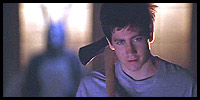 First, a funny story. When "Donnie Darko" was unceremoniously dumped in a handful of theaters in October 2001 with precious little promotion, I was fortunate enough to seek it out at the Regal Countryside 20 multiplex in Sterling, Va. What I discovered was one of the most innovative, intricate, entertaining, emotionally powerful motion pictures of the new century. I was veritably blown away, and easily placed it at #1 on my "Best of 2001" list. It was only months later, when I viewed "Donnie Darko" on DVD, that I realized something was amiss. The film was not what I had seen in theaters. Sure, all the brilliant scenes were there, and all the top-notch actors, and the same thought-provoking storyline, but the movie was being told in a different, chronological sequence of events. Fearing the theatrical release had been dumbed-down for video/DVD, I did some Internet research and talked to other people who had caught it in theaters (there weren't many). It was only then that the truth came to fruition. The film reels had gotten mixed up at my screening, and, therefore, the "Donnie Darko" I saw in theaters was told completely out of the intended order. What I assumed was simply a fresh, unorthodox way of telling the story (my lack of confusion aided by occasional title cards of the date placed throughout the film) was actually a complete and utter screw-up on the theater's part. It is a testament to the air-tight screenplay and awesomely visionary filmmaking of director Richard Kelly that "Donnie Darko" was brilliant and comprehensible—a modern masterpiece, really—no matter what order the scenes were in. This memory will stick with me forever as a reminder of the technical and narrative craftsmanship alive in this one-of-a-kind cinematic work of art.
First, a funny story. When "Donnie Darko" was unceremoniously dumped in a handful of theaters in October 2001 with precious little promotion, I was fortunate enough to seek it out at the Regal Countryside 20 multiplex in Sterling, Va. What I discovered was one of the most innovative, intricate, entertaining, emotionally powerful motion pictures of the new century. I was veritably blown away, and easily placed it at #1 on my "Best of 2001" list. It was only months later, when I viewed "Donnie Darko" on DVD, that I realized something was amiss. The film was not what I had seen in theaters. Sure, all the brilliant scenes were there, and all the top-notch actors, and the same thought-provoking storyline, but the movie was being told in a different, chronological sequence of events. Fearing the theatrical release had been dumbed-down for video/DVD, I did some Internet research and talked to other people who had caught it in theaters (there weren't many). It was only then that the truth came to fruition. The film reels had gotten mixed up at my screening, and, therefore, the "Donnie Darko" I saw in theaters was told completely out of the intended order. What I assumed was simply a fresh, unorthodox way of telling the story (my lack of confusion aided by occasional title cards of the date placed throughout the film) was actually a complete and utter screw-up on the theater's part. It is a testament to the air-tight screenplay and awesomely visionary filmmaking of director Richard Kelly that "Donnie Darko" was brilliant and comprehensible—a modern masterpiece, really—no matter what order the scenes were in. This memory will stick with me forever as a reminder of the technical and narrative craftsmanship alive in this one-of-a-kind cinematic work of art.
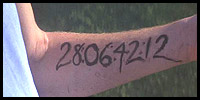 Because there was no seeming support from distributor Newmarket Films upon its original release, "Donnie Darko" had to rely, first and foremost, on the persuasion of word-of-mouth once it hit DVD. And that it did, quickly becoming a fevered cult phenomenon, with passionate viewers showing the movie to their friends, and those friends showing it to their friends, and so on. In my 2003 Stage & Screen course at American University, one of the assignments was to bring in a clip from one of your favorite movies and present it to the class. I chose the note-perfect "Head Over Heals" sequence from "Donnie Darko," an amazing, fluidly shot three minutes played to the '80s Tears for Fears classic, that anyone who has seen the film will immediately remember in vivid detail. A select few people in the class had, indeed, seen the film, their response one of excited anticipation when I announced my presentation was on "Donnie Darko." As the clip unfolded before the class, I could hear whispers of surprise as, one after the other, a well-known actor made their appearance in a motion picture they had never heard of. Once the scene was over, I was bombarded by questions about the film, a large number of students so intrigued by what they had just seen that they wanted to watch the movie for themselves once they could get ahold of it. "Donnie Darko" is like that—watch any random scene, and you are hooked for good. Watch the whole film, and you will be an instant fan.
Because there was no seeming support from distributor Newmarket Films upon its original release, "Donnie Darko" had to rely, first and foremost, on the persuasion of word-of-mouth once it hit DVD. And that it did, quickly becoming a fevered cult phenomenon, with passionate viewers showing the movie to their friends, and those friends showing it to their friends, and so on. In my 2003 Stage & Screen course at American University, one of the assignments was to bring in a clip from one of your favorite movies and present it to the class. I chose the note-perfect "Head Over Heals" sequence from "Donnie Darko," an amazing, fluidly shot three minutes played to the '80s Tears for Fears classic, that anyone who has seen the film will immediately remember in vivid detail. A select few people in the class had, indeed, seen the film, their response one of excited anticipation when I announced my presentation was on "Donnie Darko." As the clip unfolded before the class, I could hear whispers of surprise as, one after the other, a well-known actor made their appearance in a motion picture they had never heard of. Once the scene was over, I was bombarded by questions about the film, a large number of students so intrigued by what they had just seen that they wanted to watch the movie for themselves once they could get ahold of it. "Donnie Darko" is like that—watch any random scene, and you are hooked for good. Watch the whole film, and you will be an instant fan.
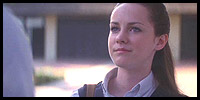 Based on its newfound popularity, Newmarket Films has allowed director Richard Kelly to fine-tune the visual effects work, garner some period songs that were too expensive for him to buy the first time around, and reinsert twenty minutes of deleted footage that had to go in 2001 in order to keep the running time under two hours. Most unheard of of all, the studio is releasing the so-called "Director's Cut" into theaters slowly around the country, in hopes of satisfying all those who missed it the first time around while possibly garnering some new fans.
Based on its newfound popularity, Newmarket Films has allowed director Richard Kelly to fine-tune the visual effects work, garner some period songs that were too expensive for him to buy the first time around, and reinsert twenty minutes of deleted footage that had to go in 2001 in order to keep the running time under two hours. Most unheard of of all, the studio is releasing the so-called "Director's Cut" into theaters slowly around the country, in hopes of satisfying all those who missed it the first time around while possibly garnering some new fans.
 "Donnie Darko: The Director's Cut" is arguably even more complex and weighty than the 2001 version, building upon subject matter (such as time travel and religion) that was originally less developed. Is it a better film, though? No. Some of the once-deleted scenes, particularly an entire subplot involving the study of "Watership Down" in English teacher Karen Pomeroy's (Drew Barrymore) class and the added material involving Donnie's parents (Mary McDonnell, Holmes Osborne) and sisters (Maggie Gyllenhaal, Daveigh Chase), are more than welcome. They help to further build each of these vital relationships, making the concluding passages of the film all the more devastating. The rest of the changes and additions within "The Director's Cut" fall into two categories: (1) the intriguingly creative and (2) the begrudgingly acceptable. Both sets of differences, however, are unnecessary, since the theatrical version was notably close to perfection.
"Donnie Darko: The Director's Cut" is arguably even more complex and weighty than the 2001 version, building upon subject matter (such as time travel and religion) that was originally less developed. Is it a better film, though? No. Some of the once-deleted scenes, particularly an entire subplot involving the study of "Watership Down" in English teacher Karen Pomeroy's (Drew Barrymore) class and the added material involving Donnie's parents (Mary McDonnell, Holmes Osborne) and sisters (Maggie Gyllenhaal, Daveigh Chase), are more than welcome. They help to further build each of these vital relationships, making the concluding passages of the film all the more devastating. The rest of the changes and additions within "The Director's Cut" fall into two categories: (1) the intriguingly creative and (2) the begrudgingly acceptable. Both sets of differences, however, are unnecessary, since the theatrical version was notably close to perfection.
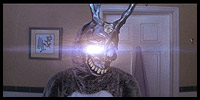 Breaking this new version up into chapters (complete with passages) from Roberta Sparrow's "The Philosophy of Time Travel" may add insight into a demanding film that, overall, asks the viewer to draw their own conclusions, but on occasion it also too glaringly spells out the plot developments. The added visual effects shots are also nice to look at, but irrelevant. Directorial changes on Richard Kelly's part are usually not for the better. The opening sequence works well as scored to INXS' "Never Tear Us Apart," but the original's opening was more atmospheric and smoothly edited to Echo and the Bunnymen's "The Killing Moon." Additionally, a pivotal moment set at the third-act Halloween party is now scored to "The Killing Moon," which is not nearly as effective as the original's song choice, The Church's "Under the Milky Way." Finally, the sound mix is also a bit different, relying overall more heavily on the score's downbeat notes and less on dialogue and songs. Such is the case with the scene in which Donnie first discovers a wormhole in his living room. In the original theatrical cut, a television commercial came on in the background advertising their town's upcoming Halloween carnival, enriching the mood and feel of the upcoming holiday. In the new cut, the audio on this advertisement has been bizarrely cut out and replaced by an ad for "Who's the Boss?"
Breaking this new version up into chapters (complete with passages) from Roberta Sparrow's "The Philosophy of Time Travel" may add insight into a demanding film that, overall, asks the viewer to draw their own conclusions, but on occasion it also too glaringly spells out the plot developments. The added visual effects shots are also nice to look at, but irrelevant. Directorial changes on Richard Kelly's part are usually not for the better. The opening sequence works well as scored to INXS' "Never Tear Us Apart," but the original's opening was more atmospheric and smoothly edited to Echo and the Bunnymen's "The Killing Moon." Additionally, a pivotal moment set at the third-act Halloween party is now scored to "The Killing Moon," which is not nearly as effective as the original's song choice, The Church's "Under the Milky Way." Finally, the sound mix is also a bit different, relying overall more heavily on the score's downbeat notes and less on dialogue and songs. Such is the case with the scene in which Donnie first discovers a wormhole in his living room. In the original theatrical cut, a television commercial came on in the background advertising their town's upcoming Halloween carnival, enriching the mood and feel of the upcoming holiday. In the new cut, the audio on this advertisement has been bizarrely cut out and replaced by an ad for "Who's the Boss?"
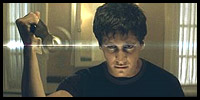 There is a difference between inserting deleted sequences into a "Director's Cut" to create character and story texture, and simply changing things around that audiences have grown accustomed to. Even with these needless excesses, it is interesting to see how director Richard Kelly would do things over, even if much of what he did on the first go-round was superior to his new changes. Having both versions handy on DVD will be appreciated. The 2001 cut is my preference, but the 2004 changes have their select attributes. Both editions, indeed, are modern masterworks—multilayered, indescribably original, and cumulatively unforgettable.
There is a difference between inserting deleted sequences into a "Director's Cut" to create character and story texture, and simply changing things around that audiences have grown accustomed to. Even with these needless excesses, it is interesting to see how director Richard Kelly would do things over, even if much of what he did on the first go-round was superior to his new changes. Having both versions handy on DVD will be appreciated. The 2001 cut is my preference, but the 2004 changes have their select attributes. Both editions, indeed, are modern masterworks—multilayered, indescribably original, and cumulatively unforgettable.
|
© 2004 by Dustin Putman |














